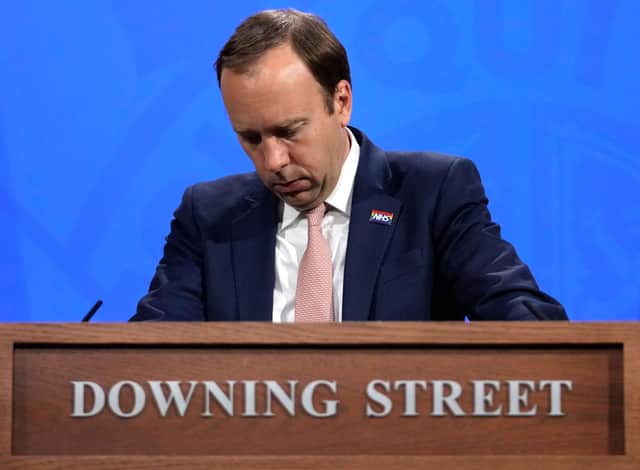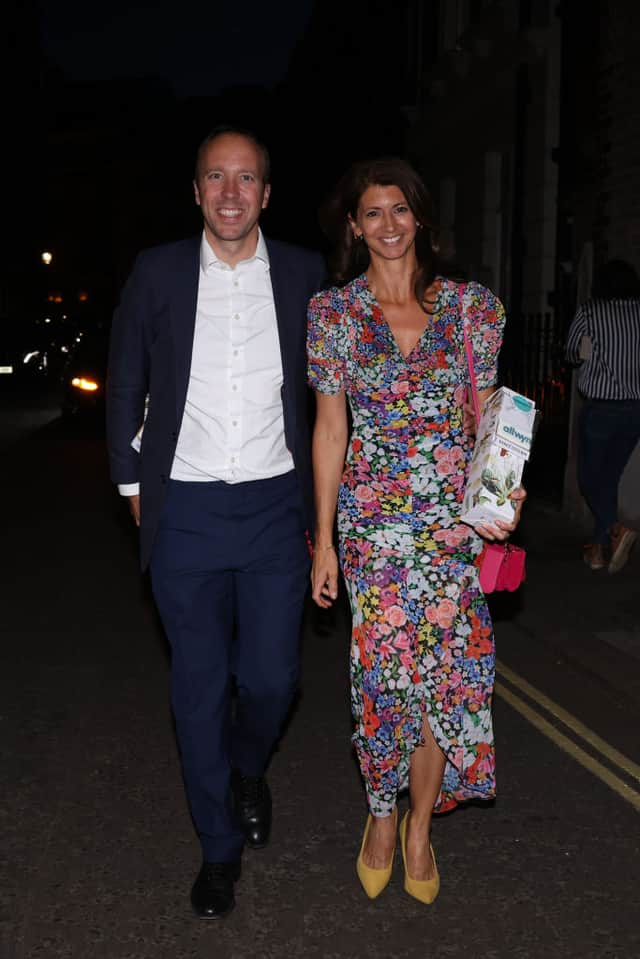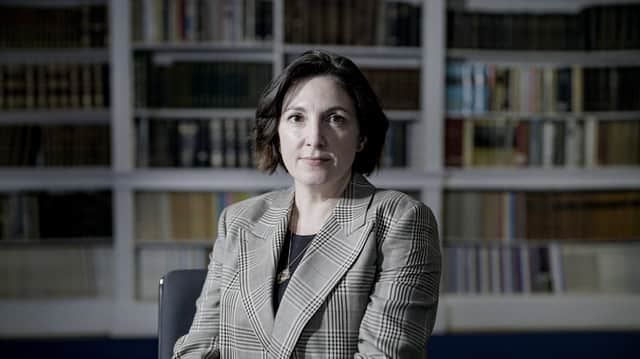UK Covid Inquiry: five shocking revelations about Matt Hancock - including pretending to play cricket
and live on Freeview channel 276
No one who worked in Downing Street during the pandemic has come out of the Covid Inquiry well, but Matt Hancock has taken a particular pasting during the last two days of evidence.
The former Health Secretary has been called a "c***" twice, a "proven liar" and has been described as having "nuclear levels" of overconfidence in sessions from Boris Johnson's former chief adviser Dominic Cummings, director of communications Lee Cain and Deputy Cabinet Secretary Helen MacNamara.
Advertisement
Hide AdAdvertisement
Hide AdThe week's hearings at the Covid Inquiry have revealed the dysfunction, indecision and dithering inside Johnson’s government. The former Prime Minister has been accused of ignoring coronavirus concerns at the start of the pandemic, allowing a "toxic culture" to manifest in Downing Street and appearing happy to let old people die if it meant loosening restrictions.
Hancock, who resigned after breaking his own Covid rules by having an affair at work, has also come up frequently in the submissions. His spokesman said: “Mr Hancock has supported the inquiry throughout and will respond to all questions when he gives his evidence.” Here are the most shocking revelations about the former Health Secretary.


Hancock said 'time and time again' there were plans in place for Covid, which was not the case
Deputy Cabinet Secretary Helen MacNamara said there was a “pattern” of “being reassured that something was absolutely fine” by former health secretary Matt Hancock before discovering it was “very, very far from fine”. She told the Inquiry that Hancock “time and time again” without “any ambiguity” told the Cabinet that plans were in place during the pandemic, which did not turn out to be the case.
MacNamara said in her statement “the usual systems of governance in Whitehall rely on people being truthful” and suggested that people working in government did not trust Hancock. Asked whether she believed Hancock was not saying things that were true, she said: “It’s definitely the view in government. I think it’s fair to say it’s what we experienced.
Advertisement
Hide AdAdvertisement
Hide AdIn another note, MacNamara said that an official told her "I have been told for years that there is a whole plan for hits. There is not plan". She added that she told Cumings and others on 13 March 2020: "I think we are absolutely fucked. I think this country is heading for a disaster. I think we are going to kill thousands of people."


'His uselessness is still killing God knows how many'
In one of the many expletive-filled messages Dominic Cummings sent about Matt Hancock to Boris Johnson, in May 2020 he said he was "unfit for this job". He said: "Hancock is unfit for this job. The incompetence, the constant lies, the obsession with media bullsh*t. Still no f*cking serious testing in care homes his uselessness is still killing God knows how many."
Cummings then added: "You need to think through timing of binning Hancock. There's no way the guy can stay. He's lied his way through this and killed people and dozens and dozens of people have seen it."
Hancock wasn't sacked and remained in post until his affair with Gina Coladangelo was revealed in June 2021 which broke his own Covid rules. Cummings speculated to the Covid Inquiry that Johnson may have wanted to keep Hancock in post as a "sacrifice" for the Inquiry.
Advertisement
Hide AdAdvertisement
Hide AdHe said that Johnson’s political secretary – Ben Gascoigne and now a member of the House of Lords – had told him “that the PM wanted to keep Hancock as ‘the sacrifice for the inquiry’."
“In my opinion this was one of his very worst and most unforgivable decisions," he said. "The PM knew and expressed often in the summer not just what a terrible job Hancock had done but how dishonest he was."


'Proven liar and c***'
In an another expletive-filled WhatsApp message, Cummings described Hancock as a "proven liar" as he demanded Boris Johnson carry out a Cabinet reshuffle in August 2020. He said: “At the moment the bubble thinks you've (sic) taken your eye off ball, you’re happy to have useless f*** pigs in charge, and they think that a vast amount of the chaotic news on the front pages is coming from no10 when in fact it’s coming from the Cabinet who are feral – if you maintain your approach of last few months, your authority will be severely weakened and you will lose good people cos (sic) they don't want to be part of something that looks like mayhem.”
On the former Health Secretary, he added: “I also must stress I think leaving Hancock in post is a big mistake – he is a proven liar who nobody believes or shd (sic) believe on anything, and we face going into autumn crisis with the c*** in charge of NHS still.”
Advertisement
Hide AdAdvertisement
Hide Ad

Hancock pretending to be cricket batsman showed ‘nuclear levels’ of overconfidence
Hancock displayed “nuclear levels” of overconfidence said Helen MacNamara, who witnessed a “jarring” episode where the then-Health Secretary adopted a cricket batsman’s stance in Downing Street. She said that it was part of the “unbelievably bullish” and dismissive culture that Boris Johnson presided over during the early phases of the outbreak.
After being ill with coronavirus, MacNamara returned to a largely “eerily empty” Downing Street in April 2020 but found Hancock had also recovered and was present. She wrote in her statement that she tried to reassure him that he did not need to be in the office, especially not in No 10, and said it must be “very hard” to be Health Secretary.
But, she said, he told her he was “loving” the responsibility and to demonstrate this, took up a “batsman’s stance outside the Cabinet room”. He then said “they bowl them at me, I knock them away”, according to MacNamara.
Asked what she was trying to say about Hancock’s character, she told the inquiry: “I’m trying to explain just how jarring some of that was.
Advertisement
Hide AdAdvertisement
Hide AdIt does partly go back to my point about the nuclear levels of confidence that were being deployed, which I do think is a problem. It really stuck with me, this moment.” She described it as “overconfidence”.
Hancock wanted to decide 'who lived and who died'
Lord Simon Stevens, the boss of NHS England during the pandemic, has said Hancock wanted to decide “who should live and who should die” if hospitals became overwhelmed by coronavirus patients.
In his witness statement, the peer said: “The secretary of state for health and social care [Hancock] took the position that in this situation he – rather than, say, the medical profession or the public – should ultimately decide who should live and who should die. Fortunately, this horrible dilemma never crystallised.”
Giving oral evidence to the inquiry, he added: “I certainly wanted to discourage the idea that an individual secretary of state, other than in the most exceptional circumstances, should be deciding how care would be provided.
Advertisement
Hide AdAdvertisement
Hide Ad“I felt that we are well served by the medical profession, in consultation with patients to the greatest extent possible, in making those kinds of decisions.” Unlike other witnesses, Stevens said he could trust Hancock "for the most part".
Comment Guidelines
National World encourages reader discussion on our stories. User feedback, insights and back-and-forth exchanges add a rich layer of context to reporting. Please review our Community Guidelines before commenting.
